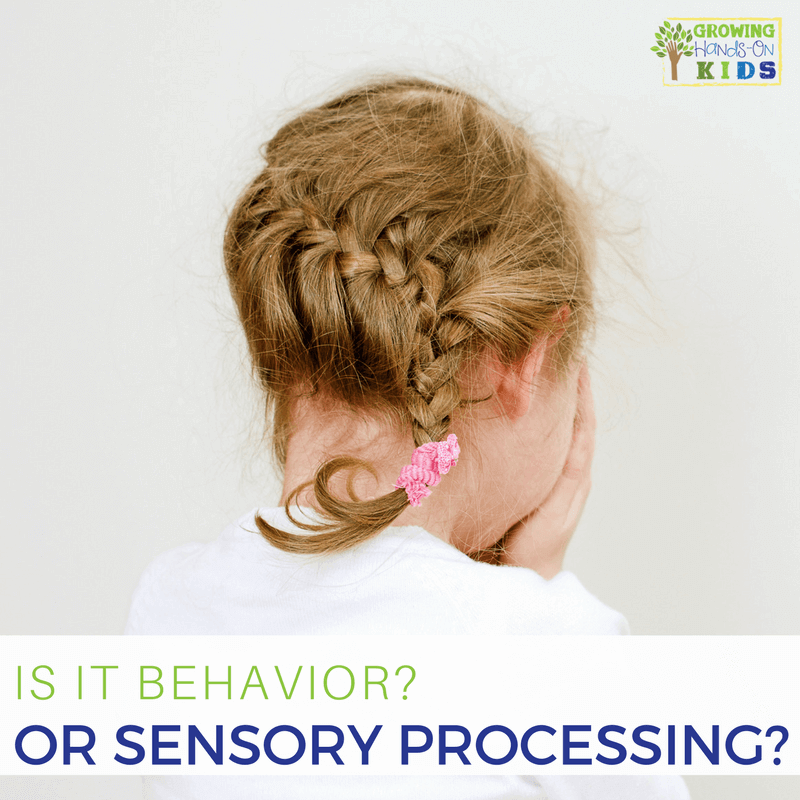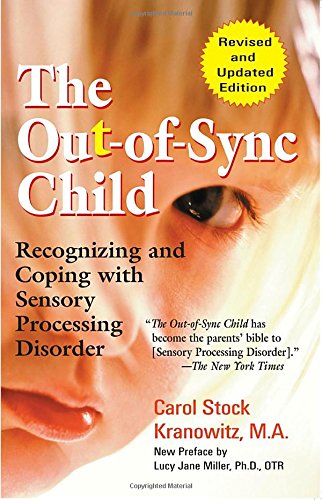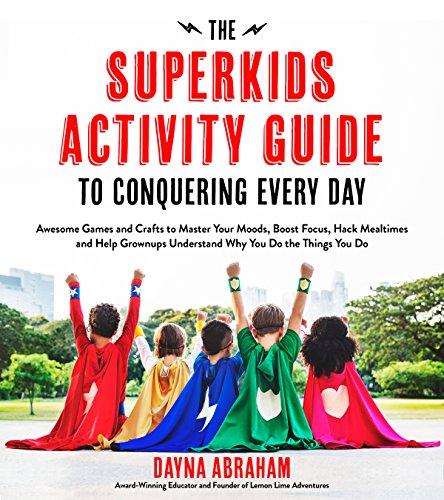Is it Behavior or Sensory Problems? A 5 Week Series
Affiliate and Referral links are used below to promote products I love and recommend. I receive a commission on any purchases made through these links. Please see my disclosure policy for more details. As an Amazon Associate, I earn from qualifying purchases.
Have you ever wondered if your child's behavior is truly a behavior issue? Maybe there seems to be an underlying sensory issue going on? Many times it is hard to tell if behavior is truly a behavior or if your child is reacting to sensory problems in their body.
In this series on behavior and sensory processing, I hope to give you some ideas and answers on whether your child's behavior is truly sensory-related or not.
You can also get a free printable of this entire series, scroll down to the bottom of this post to get it!
A couple of months ago, I attended a continuing education class by Debra Dickson, RPT titled “Is it Sensory? Or is it Behavior?”. She gave us a lot of great information that I am going to be sharing with you over the next 5 weeks. She has also given permission for this information to be shared.
Also please note, that this series only looks at behavior as linked to sensory responses. There are definitely kids who have a behavior component as well as a sensory component to their responses and behaviors.
And kids will be kids. They are going to throw fits over not getting something they wanted or for seemingly no reason at all. That just comes with the territory. I am not a licensed behavior therapist.
If you feel your child's extreme behavior is truly a behavior and not only sensory-related, please get in contact with your physician and a behavior therapist. And the same goes for sensory if you feel your child has major sensory processing problems, again consult your physician and occupational therapist.
As I stress in this entire series, every child is different, and sensory is NOT a “fix-all” type of thing. But it can definitely help, so keep reading. 🙂
Is it Behavior? Or is it Sensory?
So is your child's behavior a behavior issue or sensory?
The short answer, you may not like is: YES…. and YES! I know you probably don't want to hear that answer, so let me explain it a little bit.
The definition of behavior is: “the way in which one acts or conducts oneself, especially toward others”; “the way in which an animal or person acts in response to a particular situation or stimulus.”
The definition of sensory is: “of or relating to sensation or the physical senses; transmitted or perceived by the senses.”
Notice anything? If sensory is the sensation or physical senses and a definition of behavior is the way in which a person acts in response to a particular “stimulus” (or sensation), then YES, behaviors can happen because of sensory problems. Now does that mean that ALL behavior is sensory-related? Well, in a way, yes. Behaviors are actions based on the following things:
- Current biochemical status – chemical reactions in the brain
- Current neurological status – nerves and the nervous system
- Hardwiring of the brain
- Our perception is based on the situation – this could come from past experiences or how our brain is interpreting a situation.
The main thing to gather from this is that no two people have all the same biochemical, neurological, or hard wiring makeup. We also don't perceive situations the same! So what one person may be able to handle without “flipping out” someone else may not be able to.
A good example of this is motion sickness. Many people, my father included, become motion sick at the slightest unnatural movement or sensation in their bodies. So plane rides, boat rides, and car rides are not fun things for them. They need to take medicine to change the biochemical makeup of their brains to be able to make it through that experience without getting sick. But then there are others, myself included, who do not get sick when on a plane, or in the car, or on a boat. It all has to do with our brain makeup and wiring.
Children who are having sensory processing problems, their brains are wired much differently than the average person. Sensory information is hitting their little brains and they don't know how to process this information correctly.
It is often misinterpreted. This puts their body under a huge amount of stress. When your body is under stress, it puts you into a very primal response: fight or flight. Do you need to stand up and fight against this situation or do you need to run away from it? It is all about self-preservation.
An example of “fight” would be the mother who suddenly has super power strength in order to save a child from a dangerous situation. An example of flight would be realizing someone is following you and running for your life.
For a child who is not processing the incoming sensory information correctly, their body could be in a state of constant fight or flight mode. When their body is telling them that this situation is not safe they either need to “fight” or “flight”. They are going to react to the behavior.
The problem for many children is that their bodies are in this constant state of fight or flight for unnatural reasons. Some of these could include:
- Allergies (foods, molds, pollen)
- Sleep
- Nutrition
- Environmental factors
- Brain function
All of these play a factor in how a child is going to react to a situation. For many children, if you take a look at the 5 areas above and address these problem areas, often times a behavior will start to diminish.
But guess what?! Remember how we said, no two people are alike? That means no two treatment options are alike either. Each person comes with their own experience, hard wiring, brain function, and reaction to stimulus.
So that means each person or child needs to be looked at as an individual! Just because one treatment idea worked for one child, does not mean it works for ALL children.
This is why behavior plans in schools may work for some children, but not all. In order for a behavior plan to work, stress needs to be alleviated. For stress to be alleviated, you need to look at the 5 factors above. (allergies, sleep, nutrition, environmental factors, brain function).
In the next 5 weeks, we are going to look at some general guidelines and ideas for figuring out if your child's behavior is truly behavior or sensory-related. I want to stress that these ideas are not to be taken as medical advice. You need to seek the professional advice of your pediatrician or see a physical or occupational therapist who specializes in sensory integration therapy.
Please do not make ANY changes to your child's diet without first consulting a physician or nutritionist. This series is also to not be used as a way “diagnose your child.” The only way to find out if your child has a real sensory processing problem is to talk to your physician or Occupational Therapist. I want to also say that knowing your child's behavior is a result of a sensory processing problem does not mean they get a free pass and have no consequences!
What it does mean is that as a parent, you are looking for ways to alleviate the external or internal stressors that could be causing that behavior. I don't know many parents that like to be constantly correcting or giving out consequences for behaviors. The information in this series is not meant to give excuses, instead, it is meant to empower you as a parent to do all you can for your child and to figure out what is causing their behavior.
Here are the following topics we will be looking at:
- Is it Behavior? Or is it Sensory?
- The Vestibular System
- Diet & Nutrition
- Sleep & Screen Time
- Problem Solving Discipline & Sensory Processing
Also, check out my follow-up post “Is it REALLY Sensory?“
RECOMMENDED READING ON SENSORY PROCESSING
My friend Sharla and I wrote a brand new book all about sensory processing called Sensory Processing Explained: A Handbook for Parents and Educators.
We really wanted to create a go-to guide for parents as well as teachers, so you will find a section based on the home environment and another for the classroom.
I also recommend the following books on sensory processing.
Sensory Processing 101Raising a Sensory Smart Child: The Definitive Handbook for Helping Your Child with Sensory Processing Issues, Revised EditionThe Out-of-Sync Child: Recognizing and Coping with Sensory Processing Disorder (The Out-of-Sync Child Series)Understanding Your Child's Sensory Signals: A Practical Daily Use Handbook for Parents and TeachersThe Out-of-Sync Child Grows Up: Coping with Sensory Processing Disorder in the Adolescent and Young Adult YearsThe Superkids Activity Guide to Conquering Every Day: Awesome Games and Crafts to Master Your Moods, Boost Focus, Hack Mealtimes and Help Grownups Understand Why You Do the Things You DoThe Out-of-Sync Child Has Fun, Revised Edition: Activities for Kids with Sensory Processing DisorderThe Sensory Processing Disorder Answer Book: Practical Answers to the Top 250 Questions Parents Ask
If you are facing some behavior issues with any of your children, whether they are typical or have special needs, I hope that you can gain some information that can help you to problem-solve their behaviors and help to turn things around in your home.
Want a Printable Version of This Behavior vs. Sensory Series?
I have a printable version of the entire 5 post series that you can download when you subscribe below. Just enter your e-mail address and click the green “Download” button.
You will need to confirm your subscription in the e-mail you receive in your inbox (double check your spam box if it does not show up in your inbox). Once you confirm, the download will be automatically sent to your computer.
You'll also get my sensory processing e-mail series as a follow-up with free printables of each sensory system in each e-mail!

Heather Greutman, COTA
Heather Greutman is a Certified Occupational Therapy Assistant with experience in school-based OT services for preschool through high school. She uses her background to share child development tips, tools, and strategies for parents, educators, and therapists. She is the author of many ebooks including The Basics of Fine Motor Skills, and Basics of Pre-Writing Skills, and co-author of Sensory Processing Explained: A Handbook for Parents and Educators.













Hi Heather – We have recently started OT with our spd son and I would love to be included in your blog, is there a way to subscribe, so I can keep up with your new series. Thanks!
Ginger
Yes, there is a button on the sidebar to the left that says “Free when you subscribe- Click here”. Click on that graphic and it will take you to my blog subscriber form. I send out weekly digests of all my posts on Monday morning! I hope this series will be a blessing to you and your family!
Thank you for this article! My daughter has HFA and we are currently changing her diet in order to take away some of the “noise” that her body is fighting. (I am actually chronicling our journey via our blog)
Hi! I am looking forward to reading this series! I don’t know much about this stuff. My 4 year old daughter has reactions to different situations. Let me just say, bath time is no fun for us when she has to wash her hair. I thought it was just high anxiety to certain situations, but now I’m wondering if it is a stimulation issue. She has had sleep and eating issues since she was weeks old. She still doesn’t sleep during the night. 🙁 but my question is if this is true for her does that mean she has a form of autism or something related?
We have a sensory kid. I used to think he was strong-willed, stubborn, and defiant. However, now that I understand his Sensory Processing Disorder I understand that he has always been a child who wanted to please us, but did not understand what we were asking of him. Since we have changed our approach we have a sweet, compliant child and a much better relationship. I agree that we need to look at the five areas you mentioned. We are being allergy tested later this month so I predict things will get better still. However he still has quite a bit of anxiety so I hope one day we are able to help alleviate that further. It is a process, but I am just glad we were finally able to reach our child because we were not able to make connection with him before.
Hi Charity how did you change your approach? I am interested as I do believe my 3 yr daughter doesn’t quite understand what I expect as she so happy to please me but gets it so wrong with massive tantrums
from a
Try anything mum
So my 3 yr old could be “acting out” because of lack of sleep or nutrition?
Hi Felicia, Yes that is definitely a possibility. You can read the post on this topic here: https://www.growinghandsonkids.com/2014/05/screen-time-sleep-affect-childs-behavior.html and here:https://www.growinghandsonkids.com/2014/05/does-your-childs-diet-affect-their-behavior.html
This is why ABA should be banned. An autistic child who has their basic needs met does not have behaviour problems.
Agreed. For young children…treating the behavior or trying to change behavior is only attending to the tip of the iceburg! Attending to the underlying portions underneath the water- the SPD, the un-integrated reflexes, the diet/nutrition, etc should be the focus! You can change neurology, and re-wire the brain, but ABA is not the way to do it and have a happy, comfortable kiddo!! Trying to reach the child where they are at,not forcefully, building trusting relationships and providing the “diet” (nutrition, sensory input, etc) is how to help them grow into happy, healthy individuals!
ESPECIALLY for young children! These poor littles can barely live in their own skin so many times, but they have these expectations put on them that are truly painful. Rewards, contingencies, attempts to “change” the behavior only hit the tip of the iceberg and don’t address what could be going on underneath the water! #DIRFloortimetherapist
I would like to perhaps add a crumb of information that might widen the view here. We humans are mind, body, and spirit. The spirit element is our energy system. Unseen, but most definitely has a role in how children behave and also respond to stimulus. A child that is overreacting in their responses to the world around them tends to be a child with high energy system stress. When that energy system stress is attended to, the child’s behaviour and responses also change. I wouldn’t have believed this myself if I’d not seen it in action in my own children and also tested it on a larger scale in terms of autism. There is more detailed information on this in relation to autism here: http://theamt.com/autism_report_by_kelly_burch.htm
Please don’t be content with the labels given to your children and keep asking “Why?”. “WHY is this behaviour or sensory processing difficulty a natural expression for my child right now?” “What is going on WITHIN him that makes this expression how it is?”
I am happy to talk further on any of this. It is my passion to have children heard and their behaviour recognised as an expression of what is going on within them.
I would like to get more information about ‘is it behavior or sensory? ‘
Keeping up with this series will definitely get you started! I plan on sharing a ton of resources for further reading in the last post in this series as well! 🙂
I am so pleased I have come across this. My son has a dairy intolerance which I did not discover until he was 2 years old. His behaviour has always been very erratic and aggressive. He had constant ear infections and burst drums until I eliminated dairy. His behaviour improved and the ear infections ceased, but his ears still caused him pain and he could not hear everything, so he had grommets inserted and his adenoids taken out. After that, it was like he was a different child, discovering sounds and beginning to talk and communicate. He has always found noisy environments and social situations very difficult and will often refuse to join in, become disruptive or bite and hit other children if he feels threatened by them. My mum has recently eliminated gluten from her diet and has felt a huge improvement, so I am thinking of doing the same for my son to see if this helps make a difference with confidence socially and in new environments. I am excited to read the next five instalments!
My brother and I both grew up with chronic ear infections. Once my mother took us off all dairy, they stopped! It is amazing how what our kids eat affects their behavior! I will definitely be addressing this in the nutrition and diet post in this series! 🙂
I cant wait til I read the whole 5 parts. Have a5 year old boy with SPD and struggle everyday. Would like ideas for the nutrition and sleep parts since those are the areas where we struggle the most. Thanks 🙂
I hear you on sleep struggles! My daughter didn’t start sleeping through the night consistently until after 18 months old! I will be sure to give lots of ideas! 🙂
My son has SPD and many sleep issues. What finally worked for us was a fan for sleeping, a really dark room and a weighted blanket. Also making sure he has downtime before nap and night with his weighted
blanket on the couch before bed. And sticking to a schedule for sleep. But the weighted blanket and fan was the biggest key!
This is so interesting. I often question that about my kiddo. I’m especially interested in learning about how screen time affects behavior. Looking forward to the series.
Yes, this topic fascinates me! I am enjoying putting it together for you all! 🙂
My 4.5 yo is a sensory seeker, recently diagnosed. Ironically I am an occupational therapist myself ( but work in adult rehab) and hubby’s a Physio. Jack has medical history of severe reflux( still medicated on adult dose of ppi) plus allergies and food intolerances. We have struggles with him getting to sleep, calming down , sitting still, food refusal, concentrating and obeying us. We have tried brushing with some effect but still haven’t worked it out! Next step is psychologist …. The OT we saw said he was mild and it was more related to medical history and fear of eating and lying down. Many reflux kids in the fb group I am on seem to have sensory issues – do u know what the link is?? Am following closely 😉
Hi Kate, this was actually talked about in this course I went to where I got most of the information for this topic! I will be sharing some of it in the diet and nutrition post! If your question doesn’t get answered there, be sure to let me know! 🙂
As a holistic nutritionist I’d have to agree, especially on the nutrition aspect of things! and lack of sleep…that sure does wonders on my brain function as well 🙂
Thanks for sharing Heather; Rachael@ Diamonds in the Rough
Thanks for coming by Rachael! I definitely agree with the sleep and nutrition aspect of it. I know I get cranky and moody if I don’t get enough sleep! 🙂